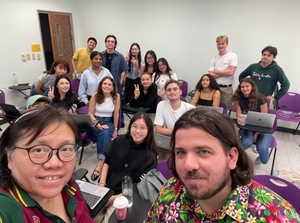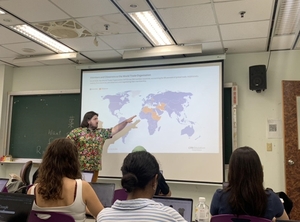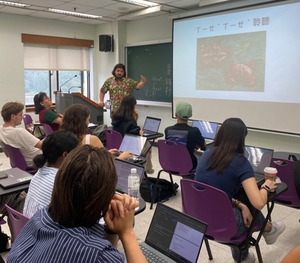




【Article by College of Communication】
On June 4, the International Master’s Program in International Communication Studies (IMICS), College of Communication, NCCU, welcomed Marcin Jerzewski, Head of the Taiwan Office at the European Values Center for Security Policy, for a special lecture titled “Taiwan’s Participation in International Organizations.” The session was hosted by Professor Lee Chyungly, Research Fellow and Professor, Institute of International Relations, NCCU, who invited Marcin as a guest speaker to enrich the course with his policy experience and international insight. Marcin, a graduate of NCCU's master's program, shared his excitement to return to the university that launched his international journey.
In his talk, Jerzewski offered students a fresh and thoughtful perspective on how Taiwan engages with the international organization. He began by introducing a theoretical framework that helps explain Taiwan’s participation in international organizations, focusing on the concept of statehood, the context of UN Resolution 2758, and the idea of strategic narratives in diplomacy.
He explained how traditional definitions of statehood, based on territory, population, and effective governance, are not the only factors that shape international participation. Jerzewski encouraged students to look beyond legal definitions and consider how political compromise, identity, and institutional flexibility play a role in shaping global inclusion. He also touched on how Taiwan navigates naming conventions and representation creatively to remain active in global affairs.
To bring the discussion to life, Jerzewski presented two case studies showing Taiwan’s practical success in international cooperation.
The first case focused on the World Trade Organization (WTO), which Taiwan joined in 2002 under the name “Separate Customs Territory of Taiwan, Penghu, Kinmen, and Matsu.” Despite the complexity of the process, Taiwan secured full membership by aligning its trade practices with WTO rules. Jerzewski highlighted Taiwan’s efforts in tariff reduction, removal of non-tariff barriers, liberalization of the service sector, and protection of intellectual property rights. These reforms reflect Taiwan’s dedication to global trade standards while maintaining its unique identity.
The second case study highlighted Taiwan’s role in the Asia-Pacific Economic Cooperation (APEC) forum. As one of 21 member economies, Taiwan participates under the name “Chinese Taipei,” a designation that allows for broad economic cooperation without getting caught in political debates. Jerzewski pointed out Taiwan’s valuable contributions to regional goals such as digital innovation, supply chain resilience, and inclusive growth—all areas where Taiwan continues to make a positive impact.
The session ended on a reflective note, with students expressing their appreciation for Jerzewski’s insightful sharing and the clarity he brought to complex international issues. Jerzewski's return to NCCU not only enriched the classroom discussion but also strengthened the sense of connection between alumni and the IMICS community.